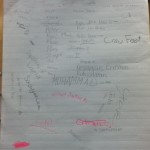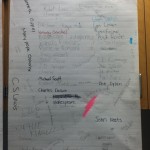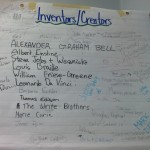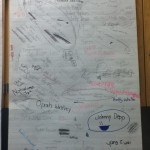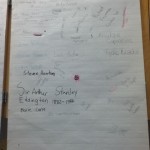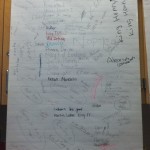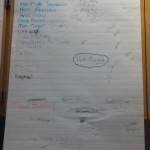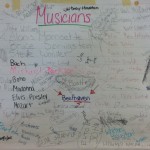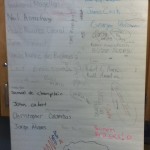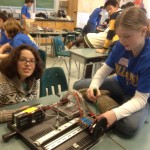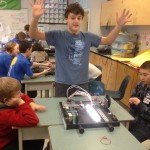An article in the Coquitlam Now today with pictures of the students exploring their passions!
Monthly Archives: February 2012
Eminent People Dinner Party Project
Ms. Moody and I had a discussion over the summer about who would we invite to dinner if we could invite anyone… and as the conversation goes we started to include different options. As we thought about this early in the fall, this project began to emerge.
Last week we did some scaffolding activities about biographies and influential people. Students had the opportunity to review research processes using both World Book online and the reference books in our school library. Student showed a significant amount of background knowledge about the genre of biographies.
The initial part of our project is to find background information about our eminent people. Students are selecting 10 people they would invite to dinner following this criteria: 5 men, 5 women, 5 different centuries represented, 10 different influences (scientists, explorers, writers, artists, athletes, inventor, musicians, politicians/rulers, spiritual) and from 3 different continents. By Thursday March 8th, students will need to complete a brief biography, explanation of why they chose the person, what would the seating plan look like and why, and a discussion about what might be the conversations that happen at the table or what might you might want to ask the people.
Edcamp in Class
Several weeks ago I had the opportunity to participate in the Edcamp43. The process of this un-conference is one that we would very much like to try with students. I have been trying to think of a time when we could bring students from across the district together to organize, host and participate in this kind of dialogue. While the logistics and possibilities percolate, we are going to incorporate it into our classes.
Two ways we have thought to use this process are for assessment and for designing our curriculum for next year. In a previous post, I disucssed how we brainstormed and came up with the topics of inquiry and themes for the past 2 years. This year we are going to try having kids post the topics they are interested in discussing on the wall on post-it notes, then clustering the most common topics (or themes that become apparent) and having discussions groups (facilitated by students) with a recorder taking notes onto a google.doc.
Once we have the themes and topics fleshed out, we’ll faciliate the students in a discussion to look for places where there are curriculum connections.
Hopefully after experiencing the process, our students will be able to envision and want to host a larger gathering for students and if not we’ll continue to dream about the possibilities.
10 New Things to Talk About
A short week again this week – teachers are gathering at Centennial Secondary today for a Professional Development Day called Layering Strategies.
- “I” Day is approaching and many students have overdue assignments. Have you submitted all 4 tasks for the Empires Project, all of your Literature Circles, Literary Devices Poster? Are you on track for Math? Students will receive invitations to “I” Day during the coming week.
- Check one of the recent student posts about last weeks Clubs Day – Robots/Making Motors and the student post about the Math on the Mountain Middle Magnet workshop
- Students had the enrichment opportunity to write the Caribou Math Contest from Brock University on Wednesday. Students are able to log in to check their results. We will be reviewing the questions and the responses. There is a daily puzzle that appears often on the contest and we found encourage students to try them out throughout the week.
- Div 6 & 7 sold, made and delivered Candy Grams on Tuesday.
- On Valentine’s Day the grade 6/7 students spend the LA class exploring love poems and sonnets. We explored some classic sonnets and looked a some lyrics across the decades.
- Math 7 & 8 both wrote Geometry tests this week… stay tuned to marks from Ms. Abbot and Ms. Moody.
- Maya, Kylee and Troy participated in the Me to We Aboriginal Education trip to deliver thousands of dollars of sports equipment for the Ditidaht Community on Vancouver Island, this past weekend. The Aboriginal Me2We students shared in cultural activities.
- Several MACC students participated in a wrestling competition at Hillcrest on Thursday afterschool. Great work team!
- On Thursday, students had to opportunity to explore the Autonomous Learners Model and 6 different learner types. We had much discussion about the characteristics on these profiles: Successful Learner, Challenging Learner, Dropout Learner, Underground Learner, Twice Exceptional Learner and the Autonomous Learner.
- We introduced biographies this week by investigating people and looking at the information available from biographies. Students have brainstormed interesting politicians, leaders, artists, writers, spiritual, musicians, scientists/inventors/creators, athletes and ones that defy category. We will be re-visiting these over the next several weeks and will evolve into a project.
Hope you are enjoying your Pro-D Day!
Clubs Day Robots
The MACC Clubs Day robots group was a very useful and fun experience. We learned a lot and did a lot of activities such as building an engine. How we built the engine is we took 2 paper clips and shaped them into a holder to hold a wire which we shaped into a rectangle with the 2 ends of the wire pointing out opposite sides, some really strong magnets and a battery with alligator clips to provide the electricity and there we have a engine (without a shell). After that we learned how to program a panel and switch it to manual and use a program on the computer to control the panel’s lights and wheel. It was Awesome!!!
Middle Magnet- Math on the Mountain
Three times a year, junior mathematicians gather at Simon Fraser University to learn more about the wonders of this field in an educational but also entertaining setting. The most recent of these workshops occurred on Thursday, February 9th, 2012, from 12:30 to 3pm, in the irmacs theatre. The day begins with the American Billions problem, a game in which one player sets down a card numbered 0-9, and then the next player sets down a card which will make the two-digit number a multiple of two, and so on. The player that “gets stuck” loses.
After a brief introduction, Roman Numerals are covered in great detail, from the adding and subtracting rules to dating buildings through hidden messages in inscriptions[1]. Then, we move on to the history of numbers, and we look at the Fibonacci sequence and Fibonacci s “Rabbit Problem.” Then, we look at Euler’s Seven Bridges of Königsberg and his networks, as well trefoil knots and Olympic rings. Finally, we move on to 3-D movie-making, which features two high-quality 3-D films and specialized glasses.
Math on the Mountain is a highly interesting and educational workshop that is not to be missed!
[1] Buildings built during the Roman Empire (such as a church inHungary) would have the numerals I, V, X, L, C, D, and M, in larger font, hidden in their inscriptions, as a method of dating.
10 New Things to Talk About
This week seemed like an exceptionally busy week. Here are our highlights:
- Friday was our 1st ever MACC Clubs Day, where students from all three MACC locations were able to sign up for workshop for the day. Options included: Chemistry of Baking, Authorship, Mask Making, Rock School @ Terry Fox Secondary, Sports Day @ Club Aviva and Cliffhanger, Geocaching, Drawing with Light (photography) and Building Motors. Students will post about their experience, as well as some photos shortly.
- Tammy Stauffer (alum from Monty & PMSS) stopped by to talk with students on Wednesday about her experiences qualifying for the Olympic Games and then not competing because of an injury and how she ended up working for Cirque du Soliel as an acrobat. She shared some strategies she used as a kinesthetic learner and how she has been resilient in the face of setbacks.
- Grade 6’s have continued to work on their final task for the Empires Project, while many of the Grade 7’s wrote the FSA. We’ll be sharing some samples of the Empires Projects here later in the week.
- The Grade 6/7’s have started a new LA unit on Poetry, while the Grade 8’s continue to work on their Classic Literature Circle and Speeches. The Poetry unit started with a pre-test to assess what students knew about poetry and literary terms. Students who demonstrated significant prior knowledge will have the opportunity for more advanced assignments and projects that will challenge students.
- All grade 6/7 students are completing a short in class assignment creating literary term posters. Students were paired with a partner(s) that they have likely not worked with this year. The posters will be completed on Monday.
- Extra-curricular activities continue at Hillcrest… currently students are able to participate in Ski & Snowboard Club, Wrestling team, Basketball teams, Table Tennis Club, Drama Club and Me to We Club.
- The MACC Classes sold Candy Grams (to be delivered on Valentines Day). We sold over 225 candy grams. Student have been assembling them and will deliver next Tuesday.
- The Aboriginal Youth Worker that supports Hillcrest has started a Culture Club on Fridays at lunch. All students are welcome to participate. This week, I heard there was bannock and hope to hear more details from the students soon.
- Mr. Aitken, our school counselor, has been having ‘class meetings’ with the grade 6’s to give them a chance to check in about their transition to middle school and MACC. He’ll continue to meet with the grade 6’s once a week until Spring Break.
- Reminder – that next Friday is a Professional Development Day, students will not be in session.
A New 10 Things, A Couple of Days Late
- Students have been continuing to look at nutrition and food sources. Following up “the Future of Food” and nutrition logs, students have been watching parts of “Super Size Me.” We will be continue to look at food and the sustainability of food sources.
- Term 3 Explorations started on January 30th. Ask your son or daughter about which exploration class they started this week.
- On Friday, students in grade 6/7 wrote a poetry pre-test. Students had the chance to show what they know. For students who already had a solid understanding of poetry and literary devices – there will be opportunities for personalization and compacting.
- Grade 7’s have completed the Empires Project and Grade 6’s will be completing their final task this week. Ms. Moody and I will be getting marks to parents and students as soon as we can.
- On February 7, 2012, Safer Internet Day, countries around the world will be promoting safer and more responsible use of online technology and mobile phones, especially among children and young people. In Canada, the Canadian Centre for Child Protection (www.protectchildren.ca) has created a unique, one-stop Internet safety website – The Door that’s Not Locked (www.thedoorthatsnotlocked.ca) – to help parents, teachers and anyone else with children in their lives learn about ways to keep kids safe on the Internet. We’ve also created a mobile safety website (mobility.protectchildren.ca) and a cell phone safety lesson plan to further help you keep your students safe.
- Table tennis club continues Monday and Wednesday afterschool. We will be having a MACC and Blue Team Table Tennis Tournament at the end of February.
- Ski and Snowboard Club continues on Thursday evenings. There is also a Whistler Ski trip scheduled for Saturday, February 11th.
- Some students have started to make the Candy Grams for Valentine’s Day. Grade 6/7 MACC classes are selling Candy Grams at lunch Monday – Thursday for $1. Students can send a note to a friend and have a candy treat delivered to them in class on Valentines Day.
- Grade 8 MACC students are working on their Classic Literature Responses. Students have had a chance to draft their responses and have a peer edit their writing. Final copies of their drafts are due next week.
- MACC Clubs Day sessions have been finalized. Plans are underway to ensure rides for students to their sessions. Students should have received a confirmation email with details about the session(s) they will be attending next Friday (February 10th).
Decoding how your child is doing
This year has been a unique situation where students have not received formal report cards due to job action by the BCTF. We have heard from parents that there are questions about how they can determine how their child is doing in class based on the assignments and test scores they have received throughout this year.
Within our classroom we use two types of assessment – formative assessment (assessment for learning) and summative assessment (assessment of learning). When we assess learning we look at the growth of learning represented by the changes on formative assessments, summative assessments and how the students assess their own work. An example from Language Arts – in our online literature circles, students receive a rubric assessing their writing. We use the BC Ministry of Education Writing Performance Standards for each grade level to assess writing. These rubrics provide evidence of the growth of the students’ writing through a weekly snapshot. The information on the rubric shows what the student is doing well and areas that the student may need to continue to improve. Often we will provide a personalized comment on the students’ assignment about the students’ writing that can provide more details or a specific focus for the following week. Students are also asked to peer assess other students writing using the same rubric.
When you look at the Performance Standards the categories are Not Yet Within Expectations, Meets Expectations, Fully Meets Expectations, Exceeds Expectations. These do not translate directly into grades. We have had conversations with students in our classes that having a piece of writing assessed in the exceeding expectations column does not mean that the grade is an “A”, that fully meeting translates into a “B”, and meets expectations is a “C+.” It is difficult to overlay one form of evaluation (letter grades) onto another (Performance Standards).
Students complete Assessment Focus (AF) questions for each lesson in Math. The Math outline provides daily assignments for students to complete and includes an AF for each topic. Students are encouraged to submit their work daily or as they complete the AF so they can get quick feedback and teachers can identify any areas of difficulty. AFs are marked using a rubric that looks at mathematical reasoning and understanding, accuracy of computations and communication of procedures. Students are assessed on whether they are excellent, proficient, adequate, or not yet adequate. We have been working with students to develop their responses to be able to be proficient in their reasoning and communication. AFs are another type of formative assessment we use in the classroom; they are assessment for learning to help identify where areas for further work. Students sign up for unit tests when they are ready to write. The unit tests are an evaluation of the learning over the course of the unit. We try to include a math project each term for students to apply their math knowledge into a `real world` situation. This term, students are working on a statistics and data analysis project – creating sports, weather and business sections of a newspaper including data tables and analysis of the data.
Have you seen the writing your students’ writing performance standards rubrics? Have you seen the assessment focus packages for math? If you haven’t, ask your student to show you these assessments.
If you are interested in reading about what other schools and teachers are writing about assessment and letter grades, you may be interesting in Rethinking Letter Grades and Assessment & Grading.
Spring Break Opportunities
Ignite your creativity over spring break!
Registration for the 2012 Spring Break Camp is now open!
Each year during spring break, Place des Arts offers a variety of art classes for children and youth from kindergarten to grade 8. Our Spring Break Camp is filled with fun and inspiring activities in the visual, literary and performing arts sure to keep kids enthused and engaged over the break.

